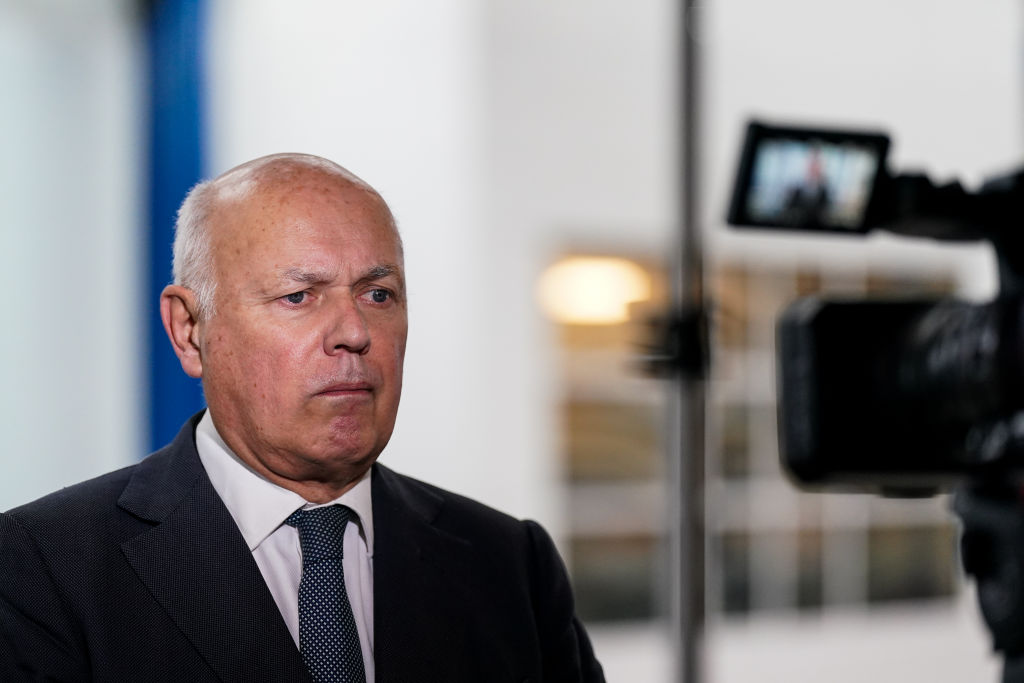One of Kemi Badenoch’s much-touted strengths is that she cares about British culture, society and our country’s values. She is renowned for her war on woke ideology, speaking out against multiculturalist dogma and identity politics. And in her appraisal of community cohesion and society at large, she shares an outlook with a predecessor as Conservative party leader, Iain Duncan Smith.
Iain Duncan Smith was on Radio 4 this morning, speaking about the perils of our liberal laws on gambling, and the relationship they have had with the dramatic increase in gambling addiction ever since Labour relaxed laws on gambling advertising in 2005. His radio appearance comes a day after the Gambling Commission said that the number of young people with a gambling problem has doubled in a year.
His has been a long-standing campaign. In September, as co-chair of a cross-party parliamentary group examining gambling harms, Duncan Smith told a House of Commons summit of a survey by Survation showing that most people support gambling bans all together. While he didn’t endorse such a move, Duncan Smith did say that ‘politicians need to find their way towards the public on this.’
His stance here puts him in obvious, direct conflict with the libertarian wing of his party, those who believe in the sacrosanctity of the market and the unfettered freedom of the individual. But Duncan Smith is not an absolutist. On this issue he displays pragmatism, a quality that is the very essence of conservatism. He has recognised a problem in society, a problem worsened by a government policy – introduced, admittedly, before the ubiquity of smartphones had been foreseen. And gambling is a problem now, one that hits the working class hardest, for those lured by the dream of an easy fix to chronic financial worries.
If he is no libertarian, nor should Duncan Smith be mistaken for a centrist, ‘one-nation’ Tory. His longstanding, vociferous opposition to the European Union forever put him at odds with the likes of Kenneth Clarke when he was party leader. His EU-scepticism was entirely consistent with his antipathy towards technocratic rule, protectionism and statist solutions in the economic sphere, and the adverse consequences they have on ordinary people in the long term. As he wrote on his blog three years ago, in regards to the UK’s failure to fully implement Brexit, and quoting a World Bank statement on how countries open to international trade grow faster and provide higher income, Duncan Smith concluded: ‘free trade has done more to reduce poverty than all the socialist plans for state control have ever done.’
Duncan Smith is no large-government ‘one-nation’ Tory, nor one who perceives everything through the prism of money or the absolute freedom of markets. He is not only in closer alignment with Kemi Badenoch, but even more so with the middle-class types and working-classes who shifted to Reform in the general election. These are people who care about their culture and society as well as their income, and much more than GNP statistics.
Short-termism has been the bane of British politics for decades
These are the types who don’t worship the state or the market. They also have a pragmatic approach. They are in favour of the market when it is fair and works for them as employees or employers. They become hostile to capitalism when it runs rampant, when globalisation and multinational corporation overreach puts them out of a job – as has been the perception and indeed reality in the north of England and America’s Rust Belt. But they are equally wary of undue state interference and it dipping ever-deeper into their own pockets, as is the case with a recent Budget that has caused so much alarm and distress.
Iain Duncan Smith’s perseverance in addressing the issue of problem gambling, and the devastation it has wrought on working-class communities and families, also demonstrates a capacity for thinking in the long term. Short-termism has been the bane of British politics for decades. Tony Blair showed it in his approach to immigration, opening the borders in 2004, something that he thought would benefit big business with cheaper labour, but two decades later have made immigration one of the biggest concerns for the working class. Short-termism lives on in 2024, with this Labour government’s capitulation on state-sector pay to avoid strikes today, causing alarm bells to ring in regards to a rise in inflation tomorrow.
Easing access to gambling was another short-term measure, designed to boost the fortunes of bookmakers and casinos back then, with catastrophic consequences for the working class seen right now. The Quiet Man is astute and bold enough to grasp this. The new Tory leader could do worse than bring to nearer to the fore this old one.







Comments